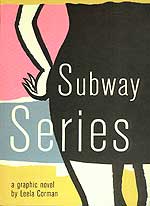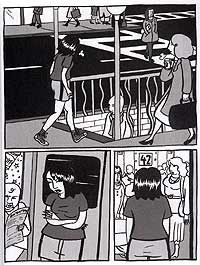The wait is over. A remarkable bounty has arrived this fall: Leela Corman's "Subway Series," Debby Drechsler's "The Summer of Love," Lynda Barry's "One Hundred Demons" and Phoebe Gloeckner's "Diary of a Teenage Girl." Even more remarkable, using different approaches, all four books explore the challenges of female adolescence. To cover them all, TIME.comix has declared October to be "Ladies' Month," reviewing each on a successive week.

|
Leela Corman's "Subway Series" (Alternative Comics; 144pp.; $9.95) follows her 1999 self-published debut, "Queen's Day." Where her first book collected short, enigmatic tales of women lost in far-away places, "Subway Series" has Corman carrying a similar theme to novel length. Though still lost, her characters have a more concrete location: New York City. "Subway Series" tells of the particular frustrations and confusions that come with being an urban teenage girl.
"Subway Series" follows several months in the life of Tina, a New York high school student. She goes to the Met, reads alty comix and feels sentimental about the decaying buildings of her city. She occasionally sees James, a pig-nosed college-age jerk who pressures her for sex. Meanwhile she has started to develop an increasingly romantic relationship with Evan, a schoolmate she takes guitar lessons from, although he has a girlfreind. With this triangle driving the story Leela Corman creates a portrait of the overly-adult lives of New York's middle-class teenagers.
 Tina goes jogging in Leela Corman's "Subway Series"
Tina goes jogging in Leela Corman's "Subway Series" |
Nobody seems to have parents. Tina and her friends stay out all night, going to unsupervised parties or drinking coffee in diners at 4:00 AM. The best adult guidance Tina gets comes from a hooker: "use a condom." Tina has become literally thick-skinned. She ignores the rain and cold. This distresses Evan who dries her hair and asks, "why don't you take care of yourself?" It's the key question of the book. As a girl growing up in the city Tina must suffer the insecurities of her age while maintaining an impossible cool. She must learn to be vulnerable in a world of particular, tangible danger. Corman draws this world of overly-mature kids in black and white, with simple, swooshy lines. Arms and legs don't bend so much as curve around. Shading has been minimized in favor of flat gray tones that emphasize blocky shapes on the page. Curiously, until the end little that could be identified as New York appears. Finally, coiled up with tension, Tina gets into her jogging shorts for a cathartic run in the New York subway system.
The teenage life that Leela Corman depicts in "Subway Series" has less in common with the world of Archie and Veronica and more in common with the movie "Kids." Adults would be appalled at the amount of sex, drugs and danger these characters indulge in. But teenagers would recognize it as totally accurate.
"Subway Series" can be found at better comic book stores and through online booksellers.
